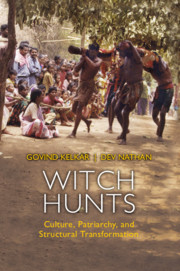7 - Witch Hunting as Women Hunting in Early Modern Europe
Published online by Cambridge University Press: 12 May 2020
Summary
Widespread witchcraft beliefs are a precondition for the occurrence of witch hunts. But their manifestation in the form of witch hunts occurs in certain social conditions. The explanatory variables that we listed earlier are (a) a culture of belief in the existence of persons, women, or men who can cause harm through supernatural powers, (b) attempts to define, redefine, or oppose patriarchal norms and roles, and (c) overall structural transformation or socio-economic changes of a major kind in which old norms are replaced or sought to be replaced by new norms. These explanatory variables can be used to understand both the predominance of women in early modern Europe as witch accused, 80 per cent of the total, and also the existence of 20 per cent, a significant number, of men as witch accused (Larner 1981).
The belief that women are witches is often attributed to misogyny and a reflection of binary thinking (Rowlands 2013), where the stereotype is that women are evil and cause harm. The binary thinking, however, goes back to the Christian belief of the original man, Adam, as good and the original woman, Eve, who herself is the origin of evil in human society (Noddings 1989). This binary thinking, in turn, creates the stereotype of the witch as woman. The witch acquires supernatural powers, which are used for evil, not from God but from Satan. In addition, Christian theology also portrays women as weak and susceptible to sexual advances and possession by the devil (Clark, in Rowlands 2013).
Christian theology and state action are reinforced by the ordinary belief in ‘magic as an inherent quality of human beings, believing that magical powers could be intensified by invoking supernatural spirits of some demonic or divine aspect’ (Hagen 2013). But women's independent access to the supernatural was seen theologically in negative terms, a result not of communion with God but of possession by Satan (Whitney 1995). Together, the combination of theology and ordinary belief produced the witch as a woman.
Was it women hunting?
Despite the general acknowledgement that most persons accused of being witches were women, there has been considerable debate on the connection between women and witches in the context of the witch hunts in early modern Europe. The debate is not about facts, since the figure of 80 per cent of those accused of being women is generally accepted.
- Type
- Chapter
- Information
- Witch HuntsCulture, Patriarchy and Structural Transformation, pp. 126 - 142Publisher: Cambridge University PressPrint publication year: 2020



